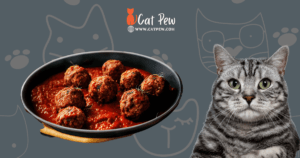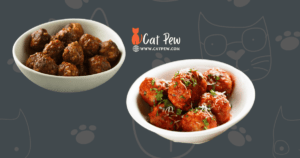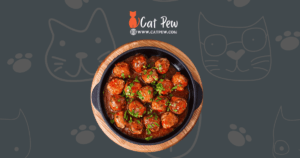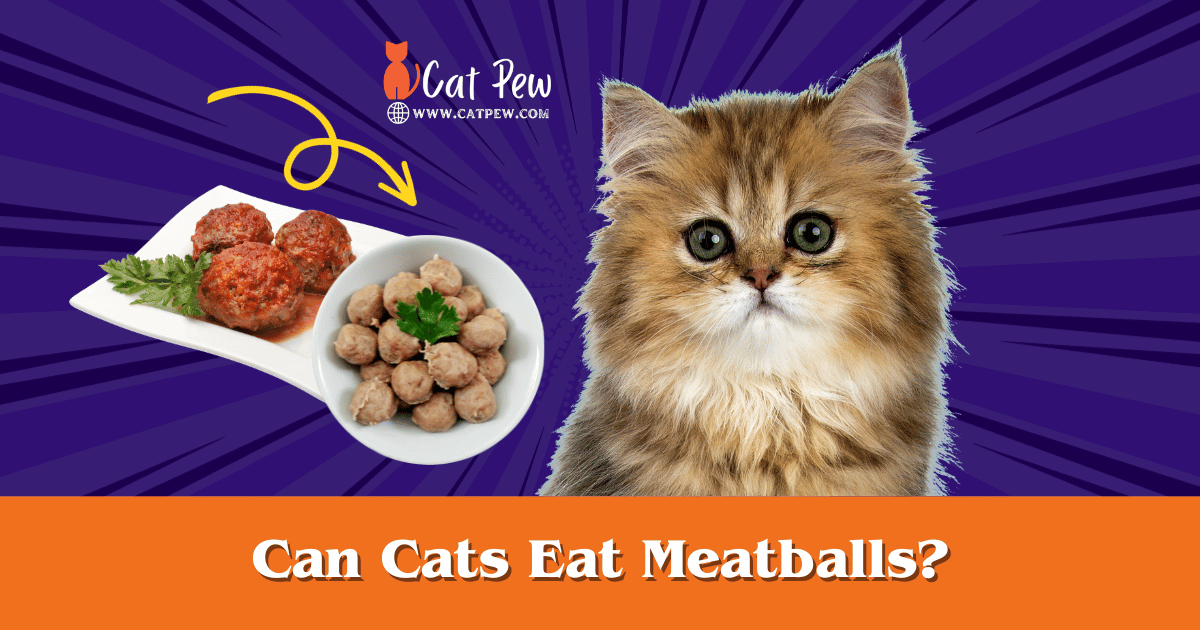Yes, cats can eat meatballs as they are carnivores and require a meat-based diet for optimal health. Cats are obligate carnivores, meaning their bodies are designed to primarily consume animal-based proteins.
As such, their diet should primarily consist of meat to ensure they receive the essential nutrients needed for their well-being. While a home-cooked meatball may seem like a tasty treat for your feline friend, it is crucial to consider a few important factors before offering it to them.
We will explore whether cats can eat meatballs, the potential risks associated with their consumption, and how to safely include meatballs in their diet. Understanding these aspects will help you make informed choices when it comes to providing the best nutrition for your beloved cat.
Are Meatballs Safe For Cats?

Feeding our feline friends can sometimes be a tricky task. With their sensitive digestive systems, it is important for us, as cat owners, to be mindful of what we offer them as treats or special indulgences. One common question that often comes up is whether or not cats can safely eat meatballs. In this article, we will delve into the topic and explore the potential risks associated with feeding meatballs to cats and what factors to consider before doing so.
Understanding The Potential Risks Of Feeding Meatballs To Cats
Before we jump into feeding our beloved cats meatballs, it’s essential to understand the potential risks that come along with it. While cats are obligate carnivores, meaning they require a diet primarily consisting of meat, not all meats are created equal when it comes to their overall safety for feline consumption.
Some meatballs may contain ingredients that are not suitable for cats and are potentially harmful to their health. For instance, certain meatball recipes might include onions or garlic, which are toxic to cats and can lead to anemia and other serious conditions. Moreover, meatballs prepared with excessive amounts of salt or seasonings can pose issues such as kidney problems or dehydration in our feline companions.
Factors To Consider Before Feeding Meatballs To Cats
While the potential risks associated with meatballs for cats have been highlighted, there are factors to consider before deciding to offer them as an occasional treat. It is crucial to take into account the ingredients used, preparation methods, and overall nutritional profile of the meatballs. Here are a few important factors:
- Ingredients: Always ensure that the meatballs you plan to feed your cat do not include any toxic substances like onions, garlic, or seasoning with high salt content.
- Preparation method: How the meatballs are prepared matters. Avoid cooking methods that involve excessive oil or frying, as this can lead to digestive upset or even pancreatitis in cats.
- Quality of meat: Opt for high-quality lean meat in the meatball recipe. This ensures that your cat receives the necessary nutrients without excessive fat or additives that could negatively impact their health.
- Serving size: Moderation is key when giving treats to your cat. Consider the size of the meatballs and the overall portion you offer, making sure it aligns with your cat’s dietary needs and weight management goals.
- Observe your cat’s reaction: The most important factor to consider is your cat’s individual response. Monitor their behavior, stool consistency, and overall well-being after indulging in meatballs. If you notice any signs of discomfort or digestive issues, it’s best to avoid offering meatballs in the future.
Investigating Common Ingredients In Meatballs That May Be Harmful To Cats
Let’s take a closer look at some common ingredients found in meatballs that may be potentially harmful to cats:
| Ingredient | Potential Harm |
|---|---|
| Onions | Toxic to cats, can cause anemia and gastrointestinal issues. |
| Garlic | Like onions, garlic is toxic to cats and can lead to anemia and digestive problems. |
| Salt | Excessive salt can lead to kidney problems and dehydration in cats. |
| Seasonings | Certain seasonings, such as certain spices, may cause upset stomach, diarrhea, or allergic reactions in cats. |
By being aware of these potentially harmful ingredients, you can make informed decisions about the meatballs you choose to serve to your feline companion.
The Importance Of A Healthy Diet For Feline Friends

A healthy diet is crucial for cats, and while they can enjoy meatballs as a treat occasionally, it’s important to ensure they are made specifically for feline consumption, without any harmful ingredients such as onions or garlic. A balanced diet that includes high-quality cat food is essential for their overall well-being and nutritional needs.
The Impact Of Diet On Cats’ Overall Health And Well-being
A healthy diet is essential for the well-being of our feline friends. Cats are obligate carnivores, which means that their bodies require a diet rich in animal protein to thrive. Feeding them a balanced and nutritious diet is crucial for their optimal health and overall well-being.
When cats are provided with a diet that meets their nutritional needs, it can have a significant impact on their overall health. A well-balanced diet can help support their immune system, maintain a healthy weight, promote strong bones and teeth, and improve their skin and coat condition.
Additionally, a proper diet can also help prevent various health issues that cats may be prone to developing. Cats that are fed a diet lacking essential nutrients can become more susceptible to illnesses and may experience a weakened immune system, digestive problems, and inadequate muscle development.
Nutritional Requirements For Cats To Thrive
Understanding the nutritional requirements of cats is key to providing them with a diet that allows them to thrive. Cats require specific nutrients in their diet, including:
- High-quality animal protein: Cats need protein as the primary component of their diet. Good sources of animal protein include meat, poultry, and fish.
- Fats: Cats need fats to provide essential fatty acids that support their skin, coat, and overall health. Sources of healthy fats include fish oil and chicken fat.
- Taurine: Taurine is an amino acid that is vital for cats’ heart health, vision, and reproduction. It is found naturally in animal tissues, especially meat and fish.
- Vitamins and minerals: Cats require a balanced combination of vitamins and minerals, including vitamin A, vitamin D, calcium, phosphorus, and others, to support their overall health.
It is important to note that cats have unique dietary needs and cannot thrive solely on a vegetarian or vegan diet. They have specific nutrient requirements that are best met through animal-based foods.
The Role Of A Balanced Diet In Preventing Health Issues
Feeding your cat a balanced diet plays a crucial role in preventing various health issues and promoting their well-being. A diet that lacks essential nutrients can lead to deficiencies that may cause serious conditions over time.
Providing your cat with a balanced diet helps prevent nutritional deficiencies, obesity, and related health problems. Obesity, for example, can lead to diabetes, joint issues, and other metabolic disorders. A diet that includes the right amount of proteins, fats, vitamins, and minerals helps maintain your cat’s ideal weight and prevents these issues from arising.
Furthermore, a balanced diet can also contribute to the prevention of urinary tract problems, dental issues, and digestive disorders. Providing your feline friend with appropriate nutrition is an investment in their long-term health and well-being.
What Constitutes A Safe Meatball For Cats?

When it comes to sharing our favorite foods with our feline friends, it’s important to remember that not all human food is safe for cats to consume. Meatballs, for example, can be a tasty treat for us, but can cats eat meatballs? The answer is yes but with some important considerations. In this article, we’ll explore what constitutes a safe meatball for cats and provide some key guidelines to keep in mind.
Identifying Cat-friendly Ingredients For Meatballs
When preparing meatballs for your cat, it’s crucial to choose ingredients that are safe and healthy for them to consume. Here’s a breakdown of some cat-friendly ingredients you can include:
| Safe Ingredients | Unsafe Ingredients |
|---|---|
|
|
By using cat-friendly ingredients, you can ensure that your meatballs are not only safe for your feline friend but also provide them with some essential nutrients.
Understanding The Significance Of High-quality Protein Sources
Protein is a crucial part of a cat’s diet, and when it comes to meatballs, it should be the main ingredient. Cats are obligate carnivores, meaning they require a diet that is rich in animal protein sources. When selecting meats for your cat’s meatballs, opt for lean options like chicken or turkey, as they are not only packed with protein but also lower in fat.
High-quality protein sources are essential for maintaining your cat’s muscle mass, supporting a healthy immune system, and promoting overall well-being.
Avoiding Seasonings And Additives That May Be Toxic To Cats
While humans enjoy a variety of seasonings and spices in our meatballs, many of them can be toxic or harmful to cats. Avoid using seasonings like onion, garlic, salt, or any other artificial additives, as they can cause gastrointestinal upset, anemia, or even more severe health issues for your feline companion.
Remember, it’s best to keep your cat’s meatballs simple and free from unnecessary additives. Stick to the basics and focus on providing them with a safe and nutritious meal.
Alternatives To Traditional Meatballs For Cats

When it comes to treating our feline friends, meatballs are a popular choice. Cats love the taste and texture of these savory balls of meat, but are they safe for our furry companions to consume?
Can cats eat meatballs? While plain, unseasoned meatballs without any potentially harmful ingredients like onions or garlic may be safe for cats to eat in small amounts, it’s important to consider their nutritional requirements. Cats are obligate carnivores, meaning they require a diet primarily consisting of meat. Traditional meatballs for humans often contain breadcrumbs, spices, and other ingredients that may not align with a cat’s dietary needs.
Recipes For Homemade Cat-friendly Meatballs
If you’re looking to treat your cat with meatballs, there are alternative recipes that you can easily whip up at home. Here are a few simple and cat-friendly options:
- Plain Chicken Meatballs:
- Ingredients:
- – Ground chicken
- – Water or chicken broth (optional)
- – Cat-friendly herbs like catnip or parsley (optional)
- Directions:
- – Preheat the oven to 350°F (175°C).
- – Mix the ground chicken with a small amount of water or chicken broth to help bind the meatballs.
- – Optionally, add some cat-friendly herbs for extra flavor.
- – Form the mixture into small, cat-sized meatballs and place them on a baking sheet.
- – Bake for approximately 20-25 minutes or until cooked through.
- – Allow the meatballs to cool before serving them to your cat.
- Tuna Meatballs:
- Ingredients:
- – Canned tuna (in water, not oil)
- – Plain breadcrumbs (optional)
- – Egg (optional)
- Directions:
- – Drain the canned tuna and place it in a bowl.
- – Optionally, mix in some plain breadcrumbs and an egg to help bind the meatballs.
- – Shape the mixture into small, bite-sized meatballs.
- – For a firmer texture, you can bake the meatballs at 350°F (175°C) for around 10-15 minutes.
- – Allow the meatballs to cool before serving them to your cat.
Commercial Cat Food Options That Mimic The Taste And Texture Of Meatballs
If you prefer the convenience of store-bought options, there are several commercial cat foods available that mimic the taste and texture of meatballs. These products are specially formulated to meet the nutritional needs of cats while satisfying their craving for meaty goodness. Some popular brands include:
| Brand |
|---|
| 1. Fancy Feast Medleys |
| 2. Weruva Cats in the Kitchen |
| 3. Blue Buffalo Wilderness |
Incorporating Meatball-like Treats Into A Well-rounded Diet
When treating your cat with meatball-like treats, it’s important to remember that they should only be given as occasional rewards or as part of a balanced diet. Here are a few tips to ensure your cat’s diet remains well-rounded:
- Consult with your veterinarian to determine the appropriate portion size and frequency of treats.
- Use meatball treats as a complement to your cat’s regular meals, not as a substitute.
- Ensure the rest of your cat’s diet consists of high-quality cat food that meets their nutritional requirements.
- Monitor your cat’s weight and adjust the treat portions accordingly to prevent excessive weight gain.
By following these guidelines, you can safely incorporate meatball-like treats into your cat’s diet, ensuring they receive the love and occasional indulgence they deserve.
Managing Cats’ Food Preferences And Allergies
Cats, being carnivores, naturally have a preference for meat-based foods. However, when it comes to introducing new food types to cats and transitioning their diet, it is important to do so gradually to avoid stomach upset or rejection. Additionally, food allergies in cats can be a common issue, making it crucial for cat owners to identify these allergies and find suitable alternatives. Furthermore, some cats may have specific dietary needs or restrictions that need to be catered to. In this blog post, we will explore these topics and provide you with insights on managing your cat’s food preferences and allergies.
Introducing New Food Types To Cats And Transitioning Their Diet
When introducing new food types to your cat or transitioning their diet, it is essential to proceed with caution. Cats can be finicky eaters, and sudden dietary changes may lead to digestive issues. To ensure a smooth transition, follow these steps:
- Start by mixing a small amount of the new food with their current food. Gradually increase the proportion of the new food over a span of 7-10 days.
- Observe your cat’s reaction to the new food. Look for any signs of gastrointestinal distress or behavioral changes.
- If your cat displays any negative reactions, slow down the transition process and consult with a veterinarian if necessary.
- Ensure that the new food meets your cat’s nutritional requirements and provides essential nutrients like taurine, which is crucial for feline health.
Identifying Common Food Allergies In Cats And Finding Suitable Alternatives
Food allergies in cats can manifest in various ways, including gastrointestinal issues, skin problems, or respiratory symptoms. Here’s how you can identify common food allergies and find suitable alternatives:
| Allergy Symptoms | Potential Allergens | Suitable Alternatives |
|---|---|---|
| Itchy skin, excessive licking or scratching | Grains (e.g., wheat, corn, soy) | Grain-free cat food or limited-ingredient diets |
| Vomiting, diarrhea, or gastrointestinal distress | Poultry (e.g., chicken, turkey) | Fish-based or novel protein diets (e.g., rabbit, duck) |
| Respiratory issues, sneezing, or watery eyes | Dairy products | Lactose-free options or alternative sources of calcium |
Catering To Cats With Specific Dietary Needs Or Restrictions
Some cats may have specific dietary needs or restrictions that require special attention. Examples include cats with renal disease, diabetes, or weight management needs. When catering to such needs, consider the following:
- Renal Disease: Restricting phosphorus levels and providing low-protein diets can help manage renal disease. Consult with a veterinarian for specific dietary recommendations.
- Diabetes: Feeding diabetic cats a well-regulated diet, low in carbohydrates, and high in protein can aid in blood sugar regulation. Again, consult with a veterinarian for tailored advice.
- Weight Management: Portion control and feeding a balanced diet with controlled calorie content are crucial for weight management. Choose a cat food specifically formulated for weight loss or consult with a veterinarian for a personalized plan.
Frequently Asked Questions On Can Cats Eat Meatballs
Can Cats Have Cooked Ground Meat?
Yes, cats can have cooked ground meat. It is important to ensure that the meat is fully cooked to avoid any harmful bacteria. However, it should be given in moderation as part of a balanced diet and not as a primary source of nutrition for the cat.
What Meat Is OK for Cats?
Cats can safely consume lean meats like chicken, turkey, and beef. Avoid seasoning or bones, which can be harmful.
Is It OK for Cats To Eat Spaghetti?
No, it is not recommended for cats to eat spaghetti. Cats have different dietary needs and spaghetti can potentially cause digestive issues. Stick to feeding them specially formulated cat food for their health and well-being.
Can Cats Eat Canned Spaghetti And Meatballs?
Cats should not eat canned spaghetti and meatballs. It is not a suitable food for them.
Conclusion
To conclude, while cats are natural carnivores and may seem inclined to enjoy meatballs, it is important to consider a few factors before feeding them this human delicacy. Ensure that the meatballs are not seasoned with harmful ingredients like onions or garlic, and preferably use lean, unseasoned meat.
Moderation is key, as excessive consumption can lead to digestive issues. Always consult with a veterinarian to ensure your feline friend’s diet remains balanced and safe.

Winston
I'm Winston, the author of this feline-focused (Catpew.com) blog . My love for cats goes back to my childhood, when I spent countless hours playing with my family's tabby, Mittens. This furry friend instilled in me a deep appreciation for the unique personalities, playful nature, and unconditional love that cats offer.

